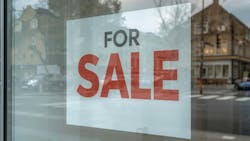Strandberg: Things That Lower the Value of Your Business
When it comes to selling your dealership, there’s plenty of talk about valuation drivers — the things that can increase the value of your company in the eyes of a buyer. But just as important, and often overlooked, are the valuation killers. These are the red flags or structural weaknesses that can quietly drag down your business’s worth or even scare off buyers entirely. If you're building with the end in mind or just want a stronger, more sustainable operation, it's critical to address these issues early.
A common killer of deals is customer concentration. If a large portion of your revenue comes from just one or two customers, buyers will view this as a major risk. What happens if that key customer leaves? A healthy customer base is one that’s diversified across multiple accounts, geographies or service types.
Aim to keep any single customer below 15% to 20% of your dealership’s total revenue, whenever possible. If you’re a traditional retail operation with hundreds of customers, this may not be relevant. If you’re a commercial dealer or a dealer with a significant chunk of business coming from one marketing channel, it’s worth a thought. We don’t talk about customer concentration enough in this industry, but it still matters.
Similarly, vendor concentration can create serious vulnerabilities. If your business depends heavily on one or two key suppliers, you’re at risk of pricing pressure, supply disruption and/or unfavorable terms. Buyers will dig into your supply chain relationships and look for alternatives. Diversifying suppliers, negotiating long-term agreements or exploring exclusive arrangements can help ease concerns. If you’ve seen fantastic businesses sitting in market for a long time without the right buyer coming along, it may be because of vendor concentration. As with customer concentration, diversification is key.
Real estate can be a major value creator or a value killer, as addressed in a previous column. Sub-optimal facilities, short-term leases, zoning issues or poor locations can all negatively impact valuation. Buyers want to see clean, compliant and ideally long-term real estate arrangements.
In some cases, poorly negotiated leases or deteriorating buildings can hurt a deal more than a bad P&L. The physical location of your dealership and its future usability can matter just as much as the numbers on paper. It’s easy to claim a business is relocatable, but in this industry, a good location with long-term staying power is paramount.
If you’re the face of your business and the one making every decision and holding every supplier and/or customer relationship, that’s a problem. While it may feel like a strength to be deeply involved, buyers see it as a risk. What happens when you leave? Businesses that run well without the owner in every meeting, estimate or transaction are considered to be more valuable. Delegation, documented processes and a strong second tier of management are crucial for attracting top buyers. It’s tempting to want to take credit for your business's success. But in the M&A process, the less you’re involved in the day-to-day, the better.
The labor shortage across the automotive industry is no secret and many dealerships continue to rely on veteran technicians who are nearing retirement. While having experienced staff is valuable, a workforce without a clear pipeline of younger talent — or at least talent who are planning on sticking around for a while — may be seen as a long-term liability. Buyers want confidence that a business can continue to operate without a generational cliff. Investing in technician development and recruiting younger staff can protect your valuation down the line. You don’t want to have a core base of technicians looking to follow you into retirement.
Have you thought about brand equity? Buyers don’t just want a cash-flowing business. They want to buy a recognizable, reputable brand, even if they’re going to re-brand your business themselves. A lack of brand identity and a poor online presence are red flags. Even small operators can build meaningful brand equity through local marketing, consistent service and customer engagement. In today’s world, an up-to-date website, an active Google presence and strong, positive customer reviews go a long way. Additionally, being involved in the local community is a nice bonus. Buyers love a community staple.
Poor financial reporting can hurt the market value of your business. You can’t get paid for what you can’t prove. Inaccurate, incomplete or overly complex financials are another deal killer. Sloppy books make buyers nervous and suggest there may be deeper operational issues. Clean financials ideally reviewed by a professional accountant will make your business easier to value and much easier to sell.
If you're considering a sale or simply want to prepare your business for long-term success, identifying and addressing these valuation killers early will serve you well. Buyers love businesses with clean books, clean facilities and clean stories. Don’t just build for today. Build for the day you’re ready to exit and make sure nothing silently eats away at the value you’ve worked so hard to create.
About the Author

Cole Strandberg
Cole Strandberg is a managing director with Focus Investment Banking’s automotive aftermarket team, specializing in mergers and acquisitions and capital raising for multi-location tire dealerships and automotive service businesses. Email him at [email protected].
